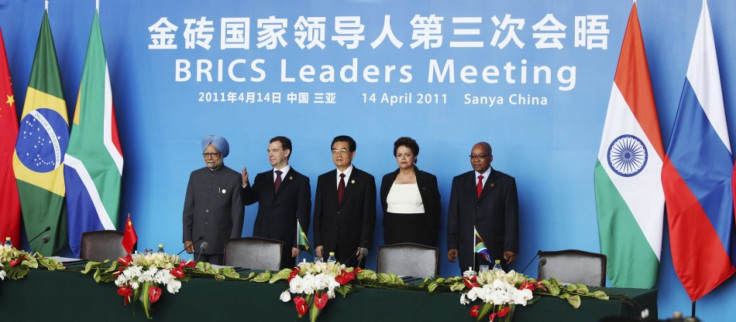BRICS Investment: U.S. Giants Sending Investment Dollars Abroad
ANALYSIS

So far this week, U.S. industrial giants have announced nearly $3 billion will be invested in new operations and research in Brazil, China and India, three cornerstone members of the BRICS countries.
The others -- Russia and South Africa -- are part of the cluster of emerging-market nations identified by a Wall Street economist 20 years ago. But they're clearly where U.S. companies see faster growth than at home.
Cisco Systems (Nasdaq: CSCO), the No. I provider of Internet gear, announced investments exceeding $1 billion for Brazil, where it plans to establish a new research center in Rio de Janeiro, invest in a special venture capital fund, extend local manufacturing and forge intellectual property agreements with local companies.
All that comes ahead of the 2016 Summer Olympics, where Brazil wants to demonstrate economic prowess and stability.
In India, Cisco, based in San Jose, Calif., said it will invest several million in a venture capital fund that specializes in rural areas. Cisco has already invested $200 million in India and plans to do more.
In fiscal 2011 ended July 30, Cisco reported U.S. revenue rose 6 percent compared to emerging market revenue that rose 14 percent.
International Business Machines (NYSE: IBM), the world's No. 2 computer company, won a $1 billion, 10-year deal from Brazilian tycoon Eike Batista's EBX Group, but also said it would invest in his group's SIX Automacao, which provides technology services to various industries.
In addition, IBM will establish a research center in Rio, joining other global centers in places including Zurich, with an estimated 100 scientists. IBM has already been working with Rio with its smarter cities' initiative in advance of the 2016 Olympics.
In the fourth quarter of 2011, IBM reported revenue from the BRICS sector rose 10 percent, compared with only a 3 percent gain for the Americas. The company is managed from Armonk, N.Y.
Meanwhile, Ford (NYSE: F), the No. 2 auto maker, announced plans to spend as much as $600 million in China for a factory in Chongqing, where it plans to double manufacturing to exceed 1.3 million vehicles by 2020.
Ford, unlike Cisco and IBM, didn't make any money in China last quarter. Indeed, its Asia Pacific Africa revenue declined 13.6 percent to $1.9 billion, on which there was a loss of $92 million, compared with a profit of $189 million in 2010.
Clearly, Ford, based in Dearborn, Mich., which was enormously profitable in the U.S., is looking to markets of the future. China's population now is nearly triple that of the U.S., with purchasing power growing steadily.
Autos, computer and Internet investment are only parts of the economy that need to be nourished, but at a time when the U.S. economy continues a slow but steady recovery, it's interesting to see where U.S. companies envision their long-term future profits.
© Copyright IBTimes 2024. All rights reserved.












